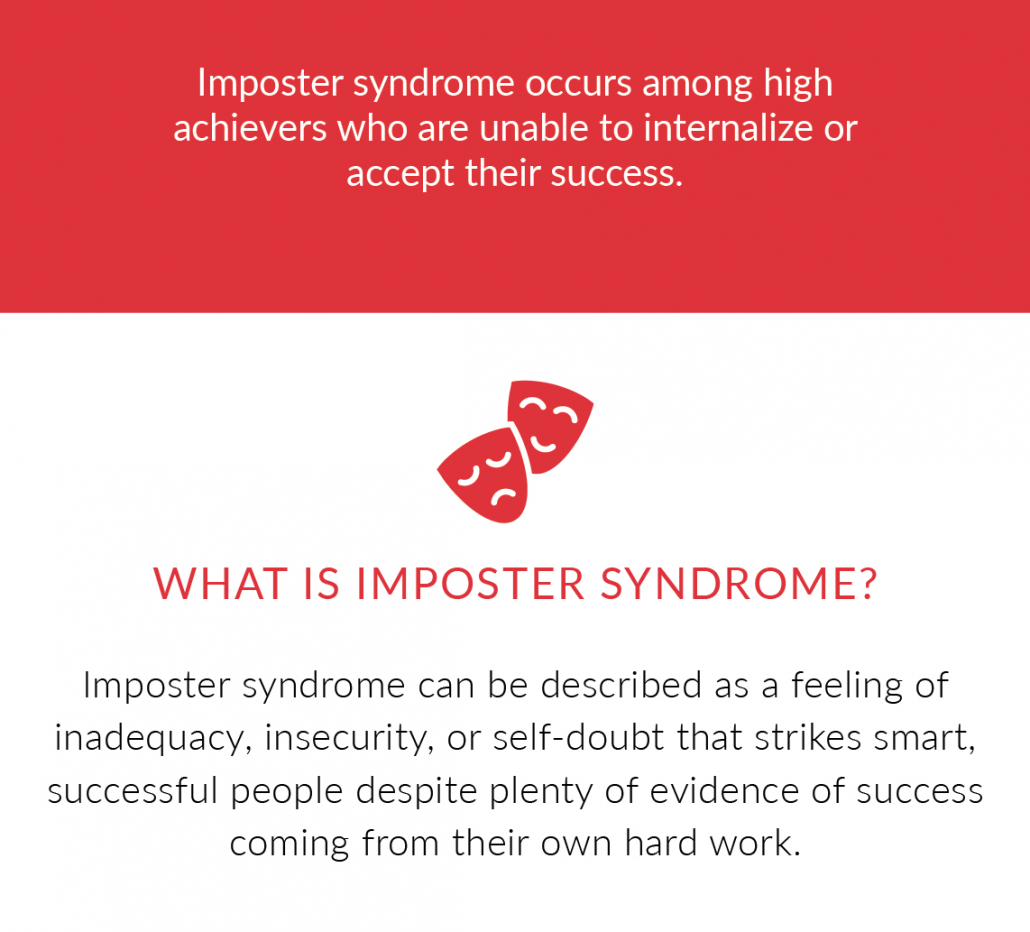First described by psychologists Suzanne Imes, Ph.D., and Pauline Rose Clance, Ph.D., in the 1970s, imposter syndrome occurs among high achievers who are unable to internalize or accept their success. Imposter syndrome can be described as a feeling of inadequacy, insecurity, or self-doubt that strikes smart, successful people despite plenty of evidence of success coming from their own hard work.
What Does Imposter Syndrome Feel Like?
People experiencing imposter syndrome have a hard time accepting their own success and often don’t believe that their accomplishments are the result of their hard work, but, instead, think that they’re just lucky and therefore undeserving of their success. Despite having success in their field, these high-achieving individuals suffer from chronic self-doubt that clouds over their accomplishments no matter how much evidence they have to back up their successes.
It’s important to note that according to researchers, imposter syndrome doesn’t necessarily connect to low self-esteem or a lack of self-confidence, but personality traits like perfectionism, particularly with women and gender diverse people traditionally underrepresented in tech. Perfectionists set very high goals for themselves, so when they experience success it often leaves them wishing they could have done better. For this type of “imposter,” being able to own and celebrate their achievements is key to avoiding burnout, finding contentment, and cultivating self-confidence.
Others who experience imposter syndrome set their bar really high, becoming very hard on themselves if it takes them too long to master a new skill. This is what Dr. Valerie Young refers to as “the natural genius.” This type of imposter tends to have a track record of being the “gifted one” in the family or peer group and avoids trying new tasks that are uncomfortable in order to avoid failure. For “natural geniuses” it is important for them to see themselves as a work in progress.
How Can You Overcome Imposter Syndrome?
Overcoming imposter syndrome starts by recognizing it in yourself and your peers. Becoming aware of your thoughts allows you to be able to reframe your mentality. It’s okay to remind yourself that it’s normal to not know everything or be good at everything, and that life is about everyday learning. Most people will have some moments where they experience self-doubt. It’s normal to not always feel 100% confident or to feel out of place. Talk to your peers — there may be some who are feeling the same way.
The Benefits of a Safe, Inclusive, and Welcoming Learning Environment
Especially when you are in the early stages of your tech career, it’s important to surround yourself with like-minded mentors and peers that will help support you throughout your journey. At Hackbright, we recognize that learning software engineering as a woman or gender diverse individual in a classroom full of men can bring about imposter syndrome, which can take a toll on the success of your education.
That’s why we have established a culture and learning environment that is safe and welcoming to people who are underrepresented in tech. All learners at Hackbright will feel supported in their studies, are free to ask questions, and will get the attention they need to make the most out of their experience. When everyone feels supported and able to speak up, they become empowered to realize their full potential.
Hackbright’s learning environment provides students and alumni with an invaluable community of peers, mentors, and leaders. The Hackbright network means a lifetime of support.
We firmly believe that when you combine a community of like-minded ambitious women, gender diverse individuals, and their allies within a network of strong support, the possibilities are endless.
Interested in learning to code? Check out our upcoming Prep Course and our immersive 12-week full-time or 24-week part-time Software Engineering Programs.


